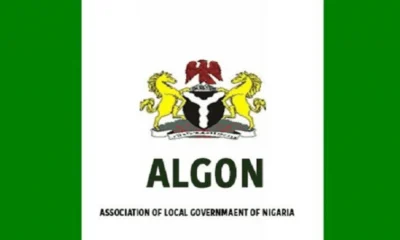NIGERIA NEWS
Supreme Court Ruling Sparks Nationwide Reaction and Governance Reassessment

The recent landmark judgement by the Supreme Court has sent shockwaves across at least 21 states in Nigeria, triggering widespread panic and prompting urgent reassessment of governance structures. The ruling, delivered on Thursday, halted the allocation of funds to non-democratically elected local government chairmen, marking a pivotal victory for the third tier of government and ending a protracted struggle for local government autonomy.
In a historic move, the Supreme Court endorsed full autonomy for all 774 local governments in Nigeria, decisively putting an end to the longstanding abuse of their affairs by certain state governors. The judgement mandates that funds from the federation account credited to local councils must now be directly deposited into their respective bank accounts. Moreover, the court explicitly prohibited governors and their affiliates from receiving, tampering with, or withholding these funds, emphasizing a strict adherence to constitutional provisions.
Justice Emmanuel Akomaye Agim delivered the lead judgement, underscoring the constitutional recognition of local governments as the third tier of government. The court’s decision aligns with arguments presented by Attorney General of the Federation and Minister of Justice, Prince Lateef Olasunkanmi, SAN, who highlighted extensive constitutional violations by governors over the past two decades.
The ruling also prohibits the arbitrary dissolution of democratically elected local government officials, affirming breaches of the 1999 Constitution in such actions. The unanimous decision by the 7-man panel of Justices underscores the judiciary’s commitment to upholding constitutional principles and promoting democratic governance at the grassroots level.
This legal victory follows a suit initiated on May 24 by the AGF against all 36 governors, challenging their handling of local government affairs. The lawsuit sought to secure autonomy for local governments and prevent governors from unilaterally dissolving elected local government officials. Despite efforts by governors to dismiss the case, the Supreme Court rejected these attempts as frivolous and lacking merit.
The immediate consequences of the judgement are already being felt, with several local government areas in 21 states set to miss their July allocation from the Federation Account Allocation Committee (FAAC). States like Jigawa, Rivers, Anambra, Kwara, Imo, Zamfara, Benue, Bauchi, Plateau, Abia, Enugu, Katsina, Kano, Sokoto, Yobe, Ondo, Osun, Delta, Akwa-Ibom, and Cross River are directly affected, either due to pending elections or delayed electoral plans.
Governors, caught off guard by the ruling, are responding with urgency. Anambra State governor, Prof. Chukwuma Soludo, has called for an emergency meeting of the Governors Forum to discuss the implications. Speaking after a meeting with President Bola Tinubu, Soludo acknowledged the democratic process of the court’s decision and emphasized the need for transparent and accountable governance at all levels.
President Bola Tinubu, who initiated the legal action, hailed the judgement as a triumph for grassroots democracy and a crucial step towards ensuring local officials are accountable to their constituents. He stressed that the ruling empowers local leaders to deliver services without excuses and promises a fairer, more accountable governance structure for all Nigerians.
Meanwhile, the National Union of Local Government Employees (NULGE) has lauded the judgement, viewing it as a significant victory after years of advocacy. NULGE’s National President, Mr. Ambali Olatunji, expressed optimism that the ruling would enhance financial integrity at the local government level and spur growth and development across communities.
Former Vice President and PDP presidential candidate, Atiku Abubakar, echoed similar sentiments, praising the Supreme Court for reaffirming the structural integrity of Nigeria’s government and advocating for broader fiscal autonomy for local governments.
However, not all reactions have been favorable. Former Delta State governor, Chief James Ibori, criticized the ruling as defective and potentially damaging to the constitutional framework. He raised concerns about the implications for federalism and the autonomy of states, urging caution in interpreting and implementing the court’s decision.
In response to these divergent views, Senate President Godswill Akpabio called for governors to respect the Supreme Court’s authority and comply with the judgement. He emphasized the separation of powers and the importance of upholding judicial decisions to ensure effective governance and democratic principles in Nigeria.
Looking ahead, Attorney General Lateef Fagbemi has warned of severe consequences for states that defy the court’s ruling, stressing the imperative of implementing the judgement without delay. He expressed confidence that the ruling would breathe new life into local government administrations and foster a more equitable distribution of resources for grassroots development.
Overall, the Supreme Court’s ruling represents a watershed moment in Nigeria’s democratic evolution, reshaping governance dynamics and reinforcing constitutional principles at the grassroots level. As stakeholders navigate the aftermath, the focus remains on fostering transparent, accountable, and responsive governance across all tiers of government.
FOLLOW US

















![Top Nigeria Newspaper Headlines Today 25th June 2024 [Tuesday] 87 Nigeria Newspaper Headlines](https://nigerianews247.com/wp-content/uploads/2024/04/Nigeria-Newspaper-Headlines-80x80.png)

![[VIDEO] Tinubu Stumbles while Boarding Presidential Parade Vehicle at Eagles Square 90 Tinubu Stumbles while Boarding Presidential Parade Vehicle at Eagles Square](https://nigerianews247.com/wp-content/uploads/2024/06/Tinubu-Stumbles-while-Boarding-Presidential-Parade-Vehicle-at-Eagles-Square-80x80.jpeg)


You must be logged in to post a comment Login